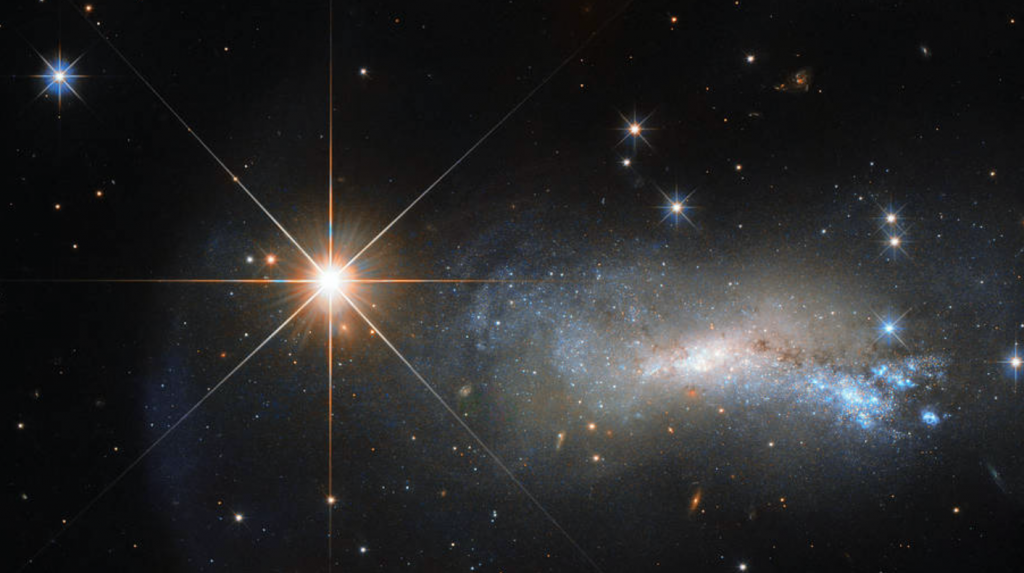Michael Nugent with the twentieth in a series of pieces on whether gods exist.
To summarise my twenty short posts so far: do gods exist? We don’t know for certain, and we can’t know for certain. But we can form reliable beliefs, to the same degree of confidence that we routinely do with other extraordinary claims.
So what are the least and most reliable ways of finding out?
I suggest that faith and personal experience are the least reliable ways, because they result in different people coming to different beliefs about the same reality.
 |
| Photo: galaxy NGC 7250 from NASA & ESA/Hubble |
Applying reason to evidence is the most reliable way, because it can more reliably result in different people coming to the same beliefs about the same reality.
When we apply reason to evidence, we notice that the idea of a god seems to be implausible. The idea of a pure bodiless mind, perfect and changeless, as the first cause of a fine-tuned universe, is increasingly incoherent the more that we examine it.
When we apply reason to evidence, we notice that reality and morality both seem as we would expect them to be if there was no god. The universe reflects evolution of imperfect life forms, with conscious beings creating their own sense of meaning and understanding of morality.
And while there are still questions that we still don’t understand the answers to, we also notice a relentless flow of natural explanations replacing supernatural ones, and nothing going in the opposite direction.
On the basis of all of this, until or unless we get new evidence to the contrary, it is reasonable to believe that there are no gods.
When we apply reason to evidence, we notice that the idea of a god seems to be implausible. The idea of a pure bodiless mind, perfect and changeless, as the first cause of a fine-tuned universe, is increasingly incoherent the more that we examine it.
When we apply reason to evidence, we notice that reality and morality both seem as we would expect them to be if there was no god. The universe reflects evolution of imperfect life forms, with conscious beings creating their own sense of meaning and understanding of morality.
And while there are still questions that we still don’t understand the answers to, we also notice a relentless flow of natural explanations replacing supernatural ones, and nothing going in the opposite direction.
On the basis of all of this, until or unless we get new evidence to the contrary, it is reasonable to believe that there are no gods.
Do Gods Exist? ➤ 20 Summary So Far
Michael Nugent with the twentieth in a series of pieces on whether gods exist.
To summarise my twenty short posts so far: do gods exist? We don’t know for certain, and we can’t know for certain. But we can form reliable beliefs, to the same degree of confidence that we routinely do with other extraordinary claims.
So what are the least and most reliable ways of finding out?
I suggest that faith and personal experience are the least reliable ways, because they result in different people coming to different beliefs about the same reality.
 |
| Photo: galaxy NGC 7250 from NASA & ESA/Hubble |
Applying reason to evidence is the most reliable way, because it can more reliably result in different people coming to the same beliefs about the same reality.
When we apply reason to evidence, we notice that the idea of a god seems to be implausible. The idea of a pure bodiless mind, perfect and changeless, as the first cause of a fine-tuned universe, is increasingly incoherent the more that we examine it.
When we apply reason to evidence, we notice that reality and morality both seem as we would expect them to be if there was no god. The universe reflects evolution of imperfect life forms, with conscious beings creating their own sense of meaning and understanding of morality.
And while there are still questions that we still don’t understand the answers to, we also notice a relentless flow of natural explanations replacing supernatural ones, and nothing going in the opposite direction.
On the basis of all of this, until or unless we get new evidence to the contrary, it is reasonable to believe that there are no gods.
When we apply reason to evidence, we notice that the idea of a god seems to be implausible. The idea of a pure bodiless mind, perfect and changeless, as the first cause of a fine-tuned universe, is increasingly incoherent the more that we examine it.
When we apply reason to evidence, we notice that reality and morality both seem as we would expect them to be if there was no god. The universe reflects evolution of imperfect life forms, with conscious beings creating their own sense of meaning and understanding of morality.
And while there are still questions that we still don’t understand the answers to, we also notice a relentless flow of natural explanations replacing supernatural ones, and nothing going in the opposite direction.
On the basis of all of this, until or unless we get new evidence to the contrary, it is reasonable to believe that there are no gods.






No comments